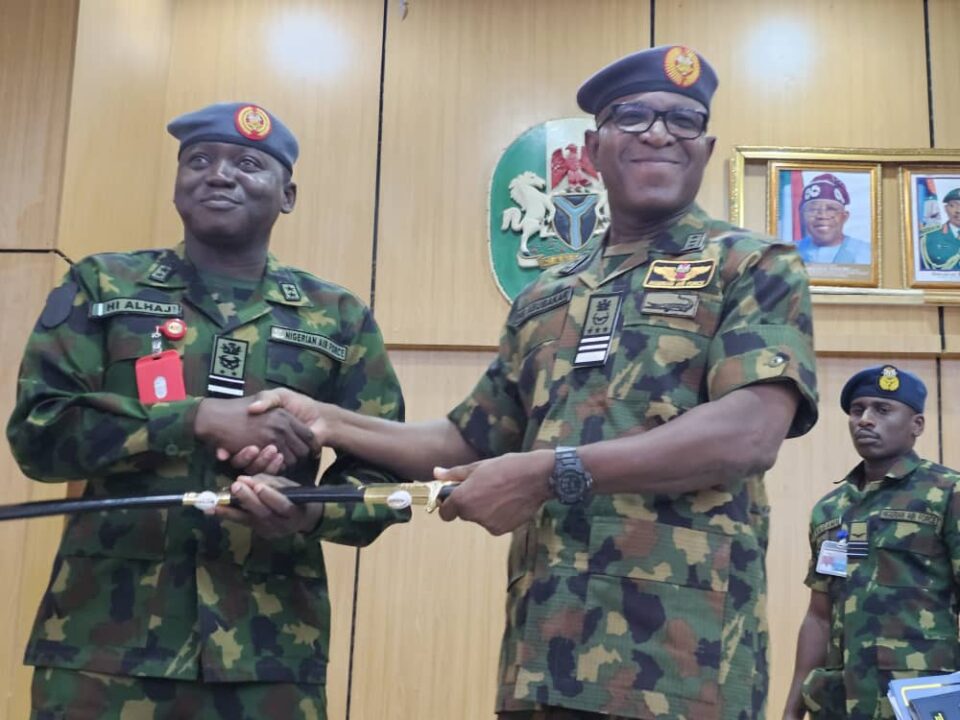Chuks Oyema-Aziken
The Chief of Air Staff (CAS), Air Marshal Hasan Abubakar has stated that his command philosophy which is, “To transform the Nigerian Air Force (NAF) into an agile and resilient force that effectively meets the airpower demands of national security in all operational environments” is critical towards building the capabilities of the NAF for future air warfare.
NAF spokesman, Air Commodore Edward Gabkwet quoted the CAS as making the statements during his paper presentation as a guest lecturer at the Armed Forces Command and Staff College, Jaji,Kaduna State on Thursday.
The press release said the CAS also noted that any armed forces that fail to prepare for the probable future will always be reactive rather than proactive in its approach to national security issues.
Speaking on the topic, “The Future of Air Warfare in the Nigerian Air Force – My Command Philosophy,” Air Marshal Abubakar went on to note that the nature of future air warfare would be determined by a number of factors, including internal and external threats to national security, the national economic fortune, and the air power capabilities of the Service.
Relating the significance of his command philosophy to NAF involvement in future warfare, the CAS reeled out the key enablers of his philosophy and how they would impact on the Service.
In his first key enabler which focuses on “Optimising force structure and establishment for enhanced operational effectiveness,” Air Marshal Abubakar stated that the NAF under his administration is acquiring more platforms including Unmanned Aerial Vehicles for real time Intelligence Surveillance and Reconnaissance and precision strikes, as well replacing its medium and heavy airlift capabilities for more effective and rapid mobility. Additionally, he continued, efforts were in the final stages to conduct the first-ever capabilities-based assessment of the NAF, which would enhance the operational effectiveness of the Service in current and future air warfare.
In analyzing the significance of the second key enabler which is on “Deliberate training and mission-oriented force development” the CAS stated that human capacity development in the NAF under his watch, is consciously tailored towards achieving assigned tasks and bridging current and future gaps in NAF capabilities. He also noted that in order to address NAF’s present and future air combat needs, about 1,476 personnel are currently enrolled in several training programmes, both domestically and internationally. He was also emphatic when he noted that, “All selections for course will be merit-based to ensure that only the most qualified are selected to give the NAF value for money.”
While discussing the relevance of the third key enabler on, “Proactive logistics support and strong maintenance culture” the CAS stated that the NAF is implementing a holistic aircraft maintenance planning system which entails that all the spares and consumables requirements for future aircraft inspections for the next 4 quarters are compiled in advance and processed with immediate effect. This, according to him, would invariably ensure that aircraft were available for quick combat against enemies in order to meet national security objectives.
Speaking on the fourth key enabler which focuses on “prioritizing research and development leveraging cutting-edge technology, strategic partnerships and lessons learnt,” the CAS stated that the NAF was making significant gains toward domestic manufacturing of required capabilities through Research and Development activities in addition to utilizing cutting-edge technologies. According to him, “The NAF has been manufacturing various military equipment to support counter-terrorism and counter-insurgency operations through the Air Force Research and Development Center.”
Regarding the last key enabler that entails “Maintaining a highly motivated force by enhancing welfare and infrastructural renewal,” the CAS maintained that to ensure that NAF personnel accomplish personal and organizational goals, the Service, he said , has a role to play in providing the enabling environment. This thinking, according to him, led to his decision to convene a committee of officers to ascertain the accommodation deficit of the NAF with a view to addressing the lingering problem of accommodation shortage. New uniforms and accoutrements, he continued, would also be issued to all personnel on a yearly basis just as payments of all entitlements are now being paid as at when due and without delay. These efforts,according to the CAS, would put NAF personnel in the right state of psychological readiness for air warfare now and in the future.
In concluding, Air Marshal Abubakar noted that if the challenges militating against operational effectiveness in the NAF persist, they could hamper its combat readiness for future air warfare. Prominent amongst these challenges, according to him, are; dwindling economic fortune, low technological base and inadequate strategic alliance. He, however, stated that it remained incumbent on the Service to surmount these challenges and build the NAF combat readiness for both current and future battles.



